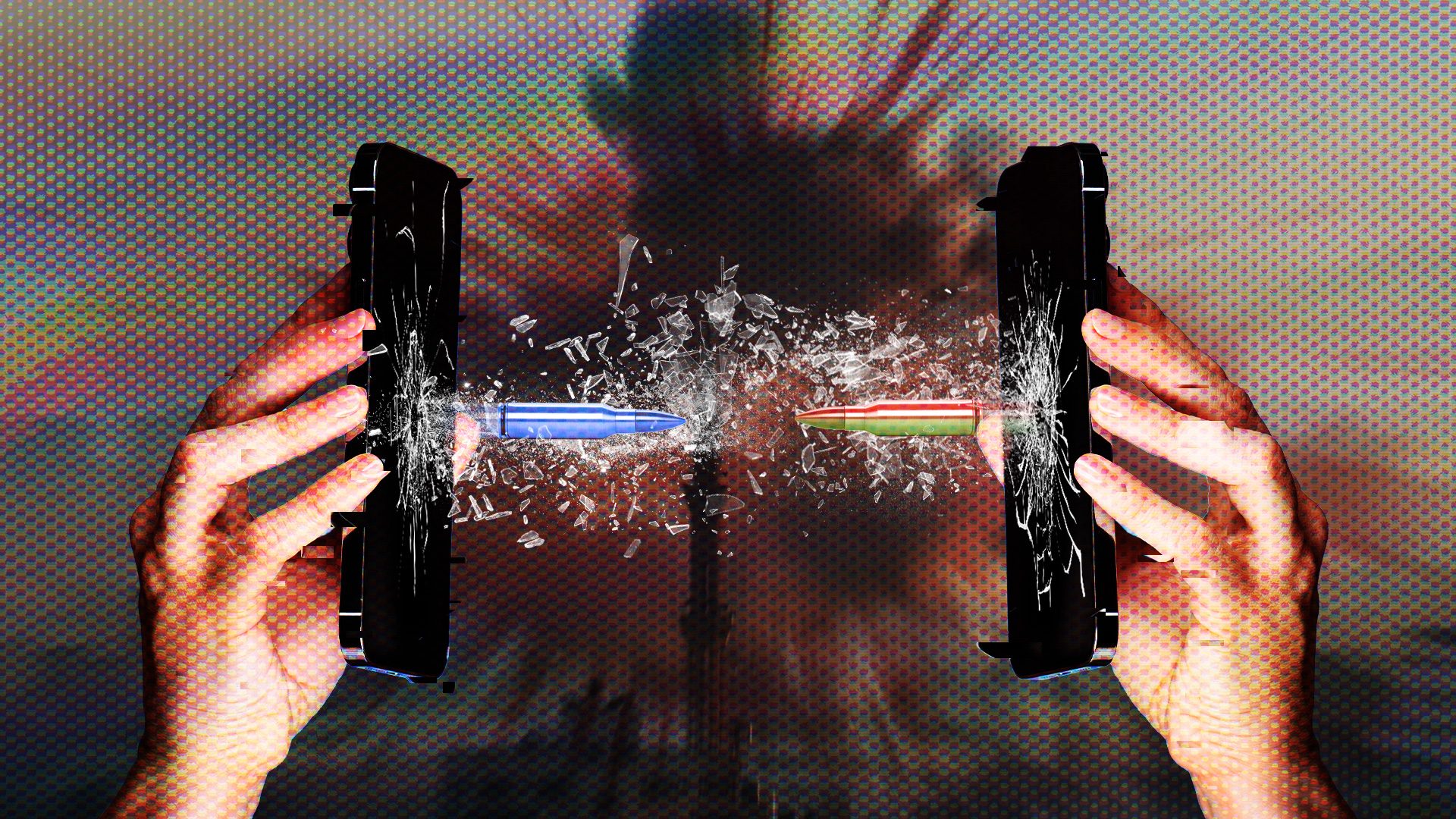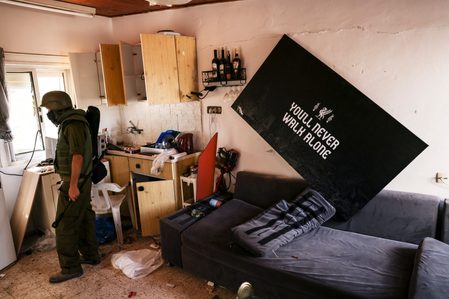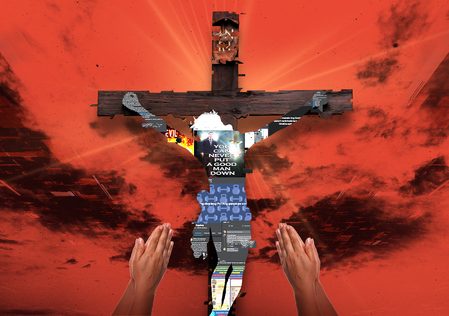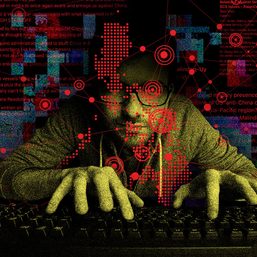SUMMARY
This is AI generated summarization, which may have errors. For context, always refer to the full article.

This story was made in collaboration with data consultancy TheNerve.
At a glance
- Following the Hamas attack on Israel, religious beliefs have divided Filipinos online in discussions related to Israel and Palestine.
- Disinformation and other misleading narratives about the Israel-Hamas war penetrate religious Facebook groups, particularly Christian communities. These narratives focus on interpretations of the Scripture that highlight Israel’s biblical significance.
- Other polarizing narratives online are Islamophobic in nature, portraying Islam as an inherently violent religion. There were also antisemitic posts.
- Some voices from religious communities are trying to challenge the prevailing stereotypes and push back against Zionist claims and Islamophobic biases.
MANILA, Philippines – Social media has yet again turned into a battleground, this time with users fiercely debating over the attacks launched by Hamas, Israel’s subsequent retaliation, and the roots behind the decades-long dispute on statehood and Israeli occupation in Palestine.
Days after Hamas attacked Israel on October 7, disinformation on the war started cropping up online. There were false claims that Hamas had surrendered to Israel five days after its attack. A video of a supposed rescue of a child from a hospital bombed in the Palestinian enclave of Gaza was posted and shared, but this turned out to be footage taken in 2016 following the Syrian government’s airstrikes near the city of Aleppo.
These falsehoods did not originate from social media accounts in the Philippines, but they were shared and reposted by Filipino social media users, prompting local fact-checkers to debunk them. A closer look at how these posts spread in the Philippines showed that many of the disinformation and other misleading narratives about the Israel-Hamas war were found among religious online communities.
Rappler analyzed public posts about Israel and Palestine from Facebook pages and groups, from October 7 to 17, 2023. In the first ten days since the Hamas attack, religious posts took up more than a third of the overall Israel-Palestine discussion in the Philippines.
(Click and drag slider to move between slides)
This is unsurprising, given that the Philippines is predominantly Catholic. Many of these religious posts contained simple prayers for either of the two countries, or Bible verses that mentioned Israel. Worth noting is that many of these conversations were around religious beliefs from the different communities of faith.
Religious beliefs shape opinions on Israel, fuel disinformation
A previous Rappler investigation showed that religious communities are especially susceptible to biblical prophecies and other misleading statements that play on their beliefs.
Melba Maggay, president of the Institute for Studies in Asian Church and Culture, said that religious narratives related to the Israel-Hamas war appeal to people worldwide. “It’s just more pronounced in the Philippines because we call ourselves a Christian country, even if it’s not entirely true,” Maggay said in a mix of Filipino and English.
According to the 2020 Census of Population and Housing, the top 3 religious affiliations in the Philippines are Roman Catholicism (78.8%), Islam (6.4%), and Iglesia ni Cristo (2.6%). Other major Protestant denominations, such as the Seventh-day Adventist Church (0.8%), the Philippine Independent Church (0.8%), and the United Church of Christ in the Philippines (0.4%) are also among the top religious affiliations in the country.
In the context of Israel and Hamas, disinformation narratives that were promoted in the Philippines – and have penetrated religious groups online, especially on Facebook – included the unconfirmed allegation that Hamas killed 40 babies and beheaded them, and that Hamas had already surrendered.

Other religious narratives did not necessarily contain disinformation, but touched on contested discussions.
For example, religious posts would talk about Israel’s biblical significance and its role in end-time prophecies. Some posts would mention Bible verses that portrayed the people of Israel as God’s chosen people, or verses that talked about the destruction of Gaza.
“It’s a reading that, globally, is very powerful because it’s from the American Bible Belt,” Maggay said, referring to the region in the US known for its strong conservative Christian culture and devotion to the literal accuracy of the Bible.
Users claimed that these Bible verses proved that Israel belonged to the Jews, and that Israel would emerge victorious in their war with Hamas.
Maggay noted that these readings are just the biblical interpretation of some theologians, and that not all Christians necessarily believe it. “One alternative reading of the scripture, actually, is about how Israel is no longer the ‘chosen people.’ The chosen people [are] the Church…. Anybody from any nation, any culture who comes to Christ,” she said.

Other posts lacked historical context behind the Israeli occupation in Palestine, calling the Hamas attack “unprovoked” – a term used by the United States government, which was met with disagreement from other voices. Groups and experts familiar with Israel’s apartheid against Palestinians said it is historically inaccurate to paint it as an unprovoked attack, as it was a result of decades-long oppression. (TIMELINE: A brief history of Gaza’s 75 years of woe)
This “unprovoked” narrative was amplified by religious members of the Philippines’ House of Representatives, with Brother Eddie Villanueva using that word to refer to Hamas’ attacks. A well-known religious leader and preacher, Villanueva represents the Citizens’ Battle Against Corruption party in Congress.
Manila 6th District Representative Benny Abante, also a pastor, said in a preaching that Palestinians have done nothing but “harass” Israel, and later poked fun at Palestinians after Israel retaliated.
“Gumanti ang Israel sa Gaza…. So, mag-ko-complain na naman ngayon ang Palestinians sa United Nations. ‘Kita mo ang ginawa sa amin? Maraming namatay sa amin.’ Sino ba ang nauna?” Abante said.
(Israel retaliated in Gaza…. So Palestinians will now complain to the United Nations. “Do you see what they did to us? Many of us died.” But who started it?)

Vlogger Sangkay Janjan, a known disinformation peddler, is also active in online discussions on Israel and Hamas. Sangkay Janjan is a devout Christian, and his religious beliefs also influence his videos on Israel’s biblical significance.

“Christians really tend to side with Israel because we are inheritors of their faith,” Maggay said.
Islamophobia, antisemitism, religious divides
Other faith-related discussions on Israel and Hamas are more polarizing in nature, and often pit religious groups against one another. Religious factors play a part in driving the Israel-Hamas war, as most Palestinians are Muslim, and most Israelis are Jewish. (READ: US antisemitic, Islamophobic incidents surge with war, advocates say)
Following the Hamas attacks, Islamophobic posts would stereotype all Muslims as terrorists or evil extremists, or would paint Islam as an inherently violent religion. Hamas has long been designated by the US government as a foreign terrorist organization.

“[When people are exposed to only these types of narratives,] they begin to have an image of Muslims as violent, as terrorists. The way they view Hamas is that they are representative of all Muslims when, in fact, that is not the case,” Maggay said.
There were also posts that vilified Jews, Israel, and/or Zionists. A few users would use the term “Israhell,” or would promote antisemitic stereotypes. For instance, one video claimed that mainstream media’s coverage of the Israel-Hamas war is biased because Jews are rich and can pay the media to promote certain narratives.
A number of posts in support of Palestine also suggested that Christians shouldn’t side with the Jews, as Jews don’t recognize Jesus as the true Messiah, and that Jews actually hate Christians.

For Maggay, the perpetuation of these stereotypes within closed circles only reinforces existing prejudices and hinders individuals from considering alternative viewpoints.
“Social media intensified those echo chambers. That’s very dangerous,” she said.
Challenging religious stereotypes
Despite the online noise surrounding the Israel-Hamas discussions in the Philippines, there are a few voices that attempt to break the preconceived notions about the involved religions.
On Facebook, Filipino Muslim content creators have spoken up against Christian’s Islamophobic tendencies. Rayyan G. Cando, who calls himself a motivational speaker, questioned Filipino Christians’ support for Jews in Israel, and why they often see Muslims as enemies. Cando said that Muslims would make better allies as they revere Jesus as a prophet in Islam.
Another Filipino Muslim, Kuya Mike TV, clarified that Islam does not tolerate terrorism, and said that the concept of jihad only permits Muslims to fight back when absolutely necessary, especially when fighting against injustice. This is evident in cases where Muslims need to defend their land, families, and rights from colonizers, killers, and oppressors.

Filipinos in the Bangsamoro region also organized a rally that gathered thousands of demonstrators who called for a halt to Israel’s military offensives in Palestine. “You don’t need to be Muslim to stand up for Gaza, you just need to be human,” a social media post read. (READ: Marcos administration stands with Israel; BARMM says ‘Palestine is us’)

Other posts slammed Filipino Christians for supporting the State of Israel, saying that biblical claims do not equate to historical claims. A Facebook page echoed an alternative biblical interpretation mentioned by Maggay, and said that present-day Jews are no longer God’s “chosen people,” and that the “new Israel” refers to the Church as a whole.
One user, who shared in a Facebook group for Filipino atheists, wonders how Israel could be “the Promised Land of God” while it kills innocent civilians.

Not all Christians stand with Israel, either. Youth organization Student Christian Movement of the Philippines (SCMP) called Christians to stand with Palestine and to condemn “Israeli Zionist settler colonialism.”
“If Jesus were alive today…He would call for the liberation of Palestine and of all oppressed victims around the world. Christians are urged to do the same,” SCMP’s statement read.

Other Christian accounts that prayed for peace also stood in solidarity with Muslims being killed and persecuted for their faith in Gaza and around the world.
“I think, for Christians, they also should get out of their stereotypes of what a Muslim or a Christian should be…. Humanity should supersede everything else,” Maggay said. – Rappler.com
This study was made in collaboration with TheNerve, a Manila-based consultancy that specializes in analyzing data to bring forth powerful insights and narratives. Believing that data can deliver real-world impact, the company enables its partners across a wide range of industries to cut through the clutter and extract value and meaning from various datasets. The insights guide partners’ business decisions and help them engage with their communities better. Composed of a team of data scientists, business strategists, award-winning storytellers, and designers, the company is on a mission to transform data science into data relevance.
1 comment
How does this make you feel?






![[The Wide Shot] Peace be with China](https://www.rappler.com/tachyon/2024/07/wideshot-wps-catholic-church.jpg?resize=257%2C257&crop=311px%2C0px%2C720px%2C720px)
![[OPINION] A critique of the CBCP pastoral statement on divorce](https://www.rappler.com/tachyon/2024/07/TL-cbcp-divorce-statement-july-19-2024.jpg?resize=257%2C257&crop=285px%2C0px%2C722px%2C720px)
![[REFLECTION] Mary, Mother of the West Philippine Sea](https://www.rappler.com/tachyon/2024/07/may-mother-west-ph-sea-july-19-2024.jpg?resize=257%2C257&crop=293px%2C0px%2C751px%2C750px)
![[OPINION] Ignorance and prejudice](https://www.rappler.com/tachyon/2024/07/tl-ignorance-and-prejujdice.jpg?resize=257%2C257&crop_strategy=attention)






Indeed, religion plays a big role in the Israel-Hamas discussion as it is the easily identified aspect of the Israel-Hamas war. The issue is complicated as it is an intertwining of the various aspects of the conflict: religious, historical, political, economic, etc. The religious aspect is a good start, but by itself alone – it cannot lead to a long-term peaceful solution to the conflict, if any.